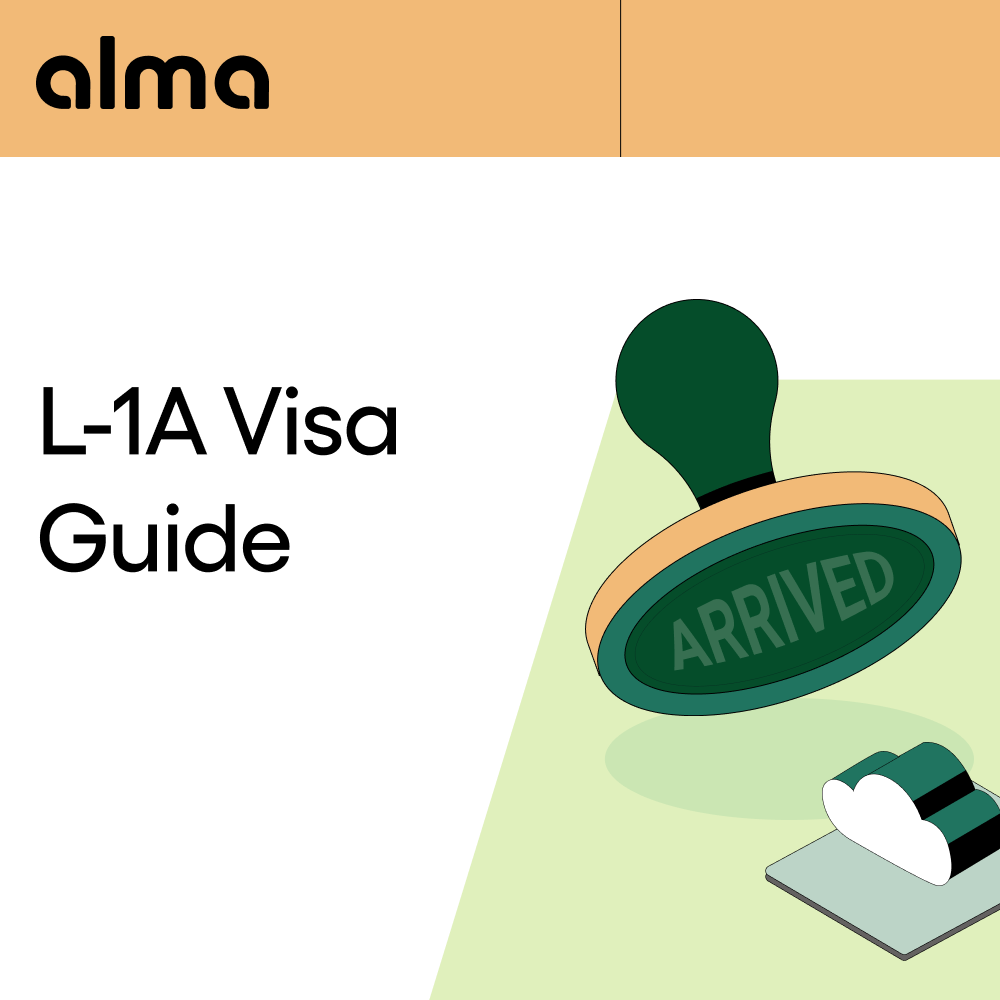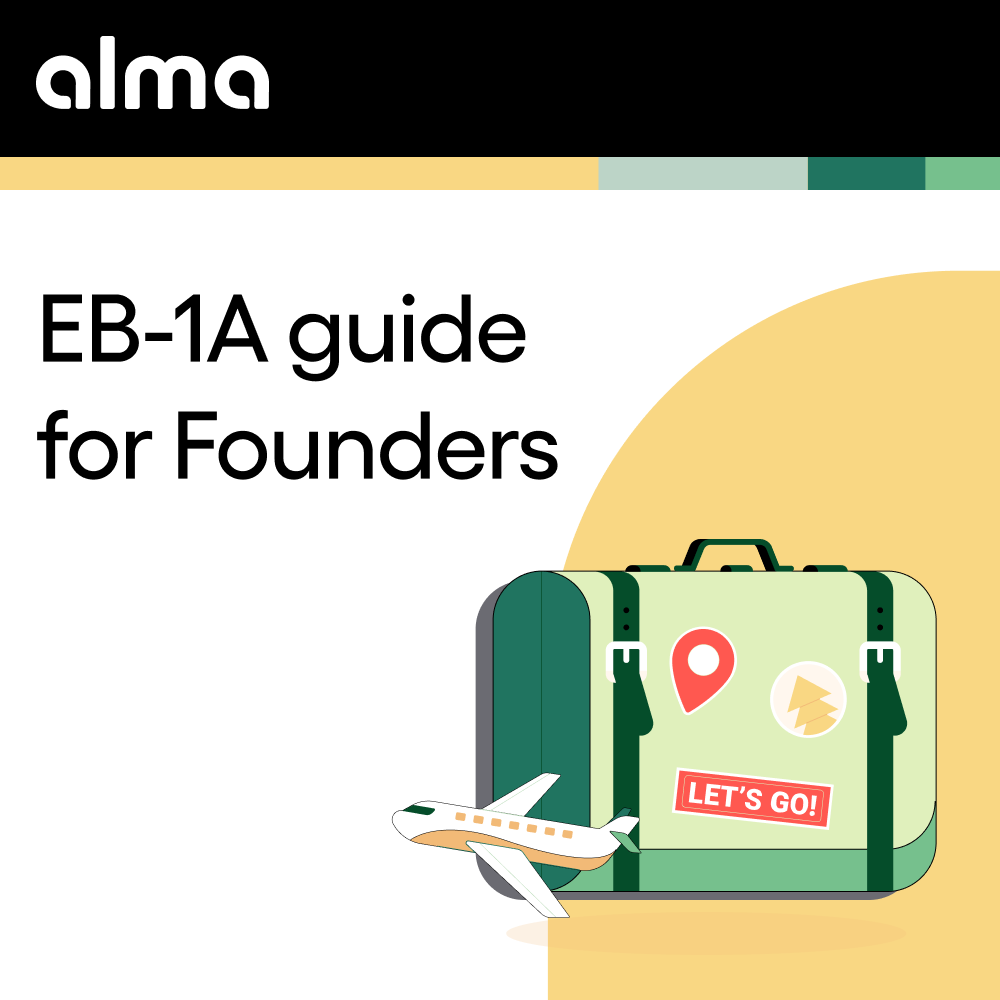- The O-1A visa is one of the most popular pathways for founders to run their own U.S. company.
- Success depends on framing achievements to meet USCIS criteria — founders must qualify under at least 3 of 8 categories.
- At Alma, petitions are prepared in two weeks, and with premium processing, the entire process can be completed in just 4–6 weeks.
The O-1A visa category is a popular option for startup founders with exceptional accomplishments and leadership experience seeking a temporary work visa in the United States.
Unlike other visas, it offers major benefits for founders, including:
- Flexibility to own and run a business
- Ability to have that business sponsor your visa
- An initial stay of up to three years, with annual renewals in one-year increments thereafter based on continued business involvement
- No annual lotteries or quotas
While not officially a dual-intent visa, the O-1 allows applicants more flexibility to pursue a Green Card while maintaining their current visa, making it a strong option for those seeking long-term residence in the U.S.
However, securing an O-1A takes preparation:
- Gathering evidence and documentation can be a complex process, as the evidence must be thorough, clear, and aligned with USCIS (U.S. Citizenship and Immigration Services) criteria.
- Not all founder achievements translate cleanly to USCIS requirements, particularly for those without academic publications, media coverage, or well-known awards.
- Setting up a real employer-employee relationship to sponsor a founder can be challenging if they’re using their own company.
- The process can also take several months (normally from four to six), and approval is never guaranteed.
As a team of highly experienced legal advisors, we've guided hundreds of people through the O-1A visa process by helping them prepare evidence and offering direct, responsive attorney access from start to finish.
Below, we break down the key eligibility criteria, common challenges, and practical considerations that startup founders should understand when exploring the O-1A visa path.
Interested in pursuing the O-1A as a startup founder? Schedule a free consultation with our legal team.
Eligibility Criteria to Show Extraordinary Ability
To qualify for an O-1A visa, applicants must demonstrate recognition in their field — either by receiving a one-time major international award (such as a Nobel Prize) or by meeting at least three of the eight USCIS criteria listed below:
1. Recognition Through Prestigious Awards or Prizes
One way applicants may qualify is by showing they’ve received major national or international awards or prizes for their work. This kind of recognition reflects how others in their field view an individual’s contributions.
In our experience, the more widely recognized and exclusive a particular award is, the more weight it carries in demonstrating peer acknowledgment.
For instance, we’ve supported clients whose successful petitions included recognition like being named to Forbes 30 Under 30, or receiving design honors like the Red Dot Award.
2. Membership in Selective Professional Associations
Founders can demonstrate national or international recognition in their field by joining a professional organization that only accepts people with outstanding achievements.
The strongest memberships are often in organizations with very low acceptance rates and well-defined (and competitive) eligibility criteria. These help show that selection was based on merit, not just participation.
Some of our clients have successfully applied for the O-1A visa by documenting membership in highly selective accelerators, such as Techstars and Y Combinator, or serving on an invitation-only steering or advisory board of a distinguished organization, like the Partnership for AI. These are just examples and professional memberships can vary widely, depending on the applicant’s area of expertise.
Note: Recently, USCIS has shown more skepticism toward accelerator memberships, sometimes treating them as indicators of future potential rather than recognition of past achievement. This can lead to Requests for Evidence (RFEs), so additional documentation may be needed to highlight how the selection process was merit-based and tied to the founder’s past accomplishments.
3. Published Coverage in Major Media or Trade Publications
Applicants can submit published material about their work in major media outlets, trade publications, or professional magazines. For startup founders, this usually means being featured in articles, interviews, or popular podcasts that show their impact in the business or tech world.
This might involve mentions of applicants’ work in national publications, articles that discuss their startup’s success, or even citations of patents. Appearances on respected tech, business, and entrepreneurship podcasts can also help support eligibility.
Examples of major publications cited in successful O-1A petitions by our clients include Times of India, The Wall Street Journal, and TechCrunch.
Overall, this criterion focuses on whether their work has received attention in respected media channels, showing that others in their field recognize their contributions.
4. Judged the Work of Others in the Field
Serving in a formal role of evaluating others’ work can also reflect peer recognition of the founders’ expertise.
We've seen successful O-1A petitions include:
- Serving on the selection committee for well-regarded startup accelerators like SkyDeck.
- Participating in angel investment groups responsible for evaluating early-stage startups, such as Angel Squad.
- Being invited to judge national or international startup competitions.
To be considered, the judging activity needs to be completed and tied to a credible, external organization. Overall, such roles highlight leadership and standing in the entrepreneurial community, especially when they involve competitions or other selective processes.
5. Original Contributions to a Field
Showing original contributions, like inventing a product, developing a new technology, or launching a company with a unique business model can serve as strong evidence of influence and innovation. The contributions should be meaningful and have a clear impact, something that moves an industry forward or solves an important problem.
In past O-1A petitions, we’ve received examples of founding and leading a startup that achieved measurable user or client growth, or creating an open-source tool that has received hundreds of thousands of stars on GitHub.
Another successful example is a client who successfully obtained an O-1A visa by showing that his company had been selected by a leading life science incubator and received support from a California state accelerator.
6. Authorship of Scholarly Articles or Publications
Demonstrating authorship of articles or other publications in a professional field can help show expertise and recognition. This might include work published in professional journals, respected industry magazines, or other major media.
It doesn't have to be academic; books, technical papers, major media articles, or trade publications can also count.
What matters is that the writing clearly reflects subject-matter knowledge and influence.
7. Critical Role in a Distinguished Organization
USCIS may consider whether the applicant has played a key role in an organization with a distinguished reputation within their field. For startup founders, this can involve leading or contributing to the growth of a company in ways that demonstrate meaningful impact.
Examples from past cases that we’ve handled include founding a venture-backed startup, helping a company reach notable revenue or user milestones, or creating jobs through leadership efforts. The focus is on showing that the individual's role wasn’t just important, but highly essential to the success of a well-regarded business or project.
This type of evidence helps demonstrate that the applicant’s contributions go beyond routine responsibilities and reflects leadership that shaped outcomes in their industry.
8. Compensation Above Industry Norms
To meet this criterion, entrepreneurs need to show they earn more than others in their field. This can include a high salary, equity (with proof of valuation) in their company, or other forms of compensation that stand out compared to industry norms, adjusted for geographic factors.
Founders can strengthen their case by providing tax returns, pay statements, and compensation. Evidence may also include owning a significant portion of their company, attracting large investments, or having raised venture capital funding that puts their startup at a high valuation.
4 Common Misconceptions About O-1 Eligibility
Below are some common misunderstandings people have about the visa requirements for the O-1A category.
1. A Startup Must Be Generating Revenue or Have Significant Investment to Qualify
One widespread belief is that a startup must be making money or have raised a lot of funding to qualify for the O-1A visa. In the many cases we’ve seen, having revenue or venture funding can make a case stronger, but it’s not a requirement under immigration law.
Founders can still be eligible even if their startup is early-stage or bootstrapped, as long as they meet three of the eight criteria. Financial backing can help support the overall petition, but it’s not the deciding factor for eligibility.
2. There Is a Specific Minimum Salary Requirement for the O-1 Visa
Another myth is that the O-1 visa has a fixed minimum salary requirement. In reality, there’s no set dollar amount that applicants must earn. However, they do need to show that they’ll be paid for the work they plan to do in the U.S.
For startup founders, this doesn’t always mean a traditional salary; it can also include things like equity in their company or other types of compensation that reflect the value of their role.
3. RFEs Result in More Legal Fees to Refile
Some believe that getting a Request for Evidence (RFE) leads to extra legal costs. That can often be true: many law firms charge by the hour to respond to RFEs, making the process more expensive and stressful.
At Alma, things work differently. We charge a flat fee that covers the entire process, including any RFE responses. There are no surprise charges or added costs. Even if a petition is denied, Alma will refile it at no extra cost.
Our team takes a complete, start-to-finish approach to each case and continues working with clients until their petition is approved.
4. O-1 Visa Applications Have Long Processing Times
It’s commonly known that O-1 visa applications take several months to process. While it’s true that standard USCIS processing can take two to four months, that’s not always the case. Some applications may take longer, especially in cases involving RFEs or if the case has unusual details.
However, the timeline can also depend on who’s handling the application. For example, Alma offers an expedited approach where the petition is typically prepared within two to three weeks after a client signs on and has given us all the information.
If premium processing is used, USCIS usually makes a decision within 15 business days. This means the entire process, from signing on with Alma to getting a decision, can often be completed in about six weeks.
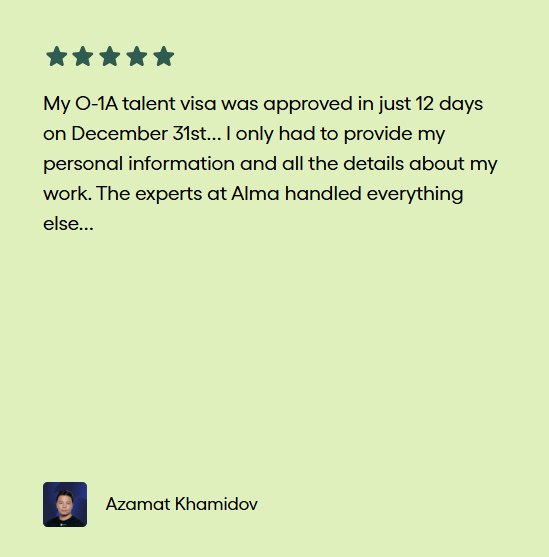
The O-1 Application Process for Startup Founders
Below are the key steps involved in applying for the O-1A visa. While this overview can help you understand what to expect, working with a legal team experienced in startup founder cases can drastically reduce the time and effort required to build a successful petition.
1. Determine Eligibility & Build Evidence
The first step is figuring out which of the eight O-1A criteria for extraordinary ability apply. For startup founders, it’s important to match these criteria to real-life achievements.
In past cases, examples have included recognition within the startup ecosystem, competitive program selections, funding milestones, or forms of compensation tied to company ownership.
Once it’s clear which visa criteria apply, the next step is to collect and organize strong documentation for each one. The evidence should clearly explain how the founder meets each category and be easy for USCIS to understand and evaluate.
2. Establish US Sponsorship
The O-1A visa requires a U.S. sponsor to file the petition. This sponsor can be an employer or a U.S.-based agent. In this case, an agent might be another person or entity authorized by a foreign employer to act on its behalf.
For startup founders who plan to self-sponsor through their own company, the process often involves forming a U.S. business entity, such as a C-Corp or LLC. It’s also important to set up a real employer-employee relationship within the company, which might include having a board of directors that oversees the founder’s role.
Part of this step usually includes signing an employment agreement with the company.
3. Prepare & File the Petition (Form I-129)
Since the O-1 does not allow self-sponsorship, the petition must be filed by a board member, co-founder, or another authorized representative with the ability to control the founder’s employment. This ensures compliance while still allowing founders to run and grow their ventures.
Once the evidence is gathered and organized, the next step is putting together the full petition package.
This includes several key documents, such as:
- A written consultation from a peer group or labor organization.
- A detailed list of the applicant’s planned work or activities.
- Proof of a job offer, often in the form of an employment agreement and company formation documents.
- Recommendation letters from experts in the person’s field. Clients who have successfully obtained the O-1A visa have included letters from five to six recognized experts.
- A supporting statement outlining eligibility under the selected criteria, with exhibits attached as evidence for each one.
The petition also includes all the evidence supporting the applicant’s extraordinary ability, clearly tied to the visa criteria they’re aiming to meet.
Form I-129, which is required to request O-1 classification, must be submitted to USCIS within a specific time window, no more than six months before the intended start date.
Some applicants use premium processing, which can lead to a decision from USCIS within about 15 business days.

4. USCIS Review & Approval
After the petition is submitted, USCIS reviews the materials to decide whether the applicant qualifies for the O-1A visa. Sometimes, they may issue an RFE if they need more information or clarification before making a decision.
If the petition is approved, USCIS will issue a Form I-797 Notice of Action, which serves as the official approval notice.
5. Consular Processing & U.S. Entry
For applicants outside the United States or those needing a new visa stamp, the process typically involves submitting a visa application, collecting the necessary documents, and attending an interview at a U.S. consulate.
Be prepared to discuss any questions about eligibility requirements or evidence that come up.
In some cases, the consulate may issue a 221(g) notice, which means the application is pending further review. This often involves providing additional documents before a final decision is made.
Upon visa issuance, travel to the U.S. and present documentation to CBP at the port of entry to begin your approved employment.
Common Pitfalls in O-1 Visa Applications for Startup Founders
Sometimes, even highly qualified applicants can run into issues during the O-1A process. Below are some of the most common mistakes entrepreneurs make when preparing their petitions.
Missing or Incomplete Documentation
One of the most common issues startup founders face in the O-1 visa process is missing or incomplete documentation. O-1 petitions usually run into the hundreds of pages (of evidence); strong founder cases typically go beyond 500 to 700 pages. Because of this, it’s easy to underestimate how much material is needed.

Founders also need to present their achievements in a way that’s easy for USCIS officers to understand. This often means converting complex descriptions into clear narratives, organizing them into exhibits, and including letters or materials that validate their accomplishments.
Leaving out even one required item, like a contract, letter of recommendation, or proof of recognition, can lead to delays. In many cases, USCIS will respond with an RFE, which can extend the process by several weeks or months.
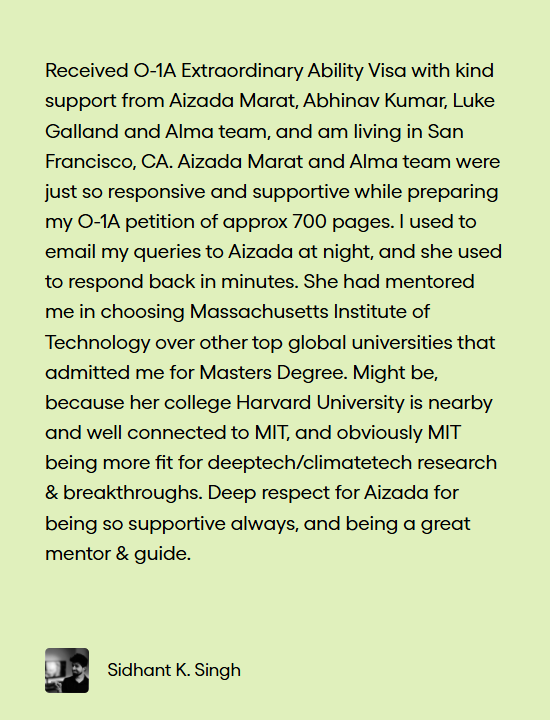
Insufficient or Weak Evidence of Extraordinary Ability
The supporting evidence needs to be clear, well-documented, and convincing. For startup founders, this can sometimes be challenging, especially when the evidence doesn’t align neatly with how USCIS typically reviews cases.
For example, some entrepreneurs are compensated primarily through equity in their company. In past cases, we’ve seen that when this kind of compensation isn’t clearly valued or documented, such as through formal agreements, it may be viewed as less reliable.
Similarly, while having strong funding or business revenue isn’t a requirement, we’ve seen it contribute to a more compelling overall case. In situations where venture capital funding is limited, entrepreneurs may need to place more emphasis on other areas of their track record.
Overall, strong petitions often include a combination of well-organized documents, third-party validation, and specific examples that show impact within the founder’s field.
Missing or Problematic Advisory Opinion
A written advisory opinion from a peer group, labor organization, or similar body in the applicant’s field should be provided. This letter is meant to offer an outside perspective on the applicant’s qualifications and achievements.
When this advisory opinion is missing, incomplete, or doesn’t clearly support the applicant’s extraordinary ability, we’ve seen that this can lead to delays, added questions from USCIS, or even requests for more evidence. Making sure this part of the petition is handled carefully can help keep the process on track.
Limited Access to Experienced Attorneys
In many immigration law firms, most of the communication goes through paralegals or case managers rather than the attorney handling the case. While support staff play a key role, limited access to an attorney can make it harder for founders to get the kind of input that’s often needed for complex visa applications.
Based on what we've seen, startup founders sometimes face unique challenges, such as how to present equity compensation or explain their leadership role within a U.S. company. These details can be difficult to address without the ability to speak directly with someone who has legal training and experience handling similar cases.
In our experience, regular attorney involvement can help identify ways to make a case stronger early in the process, before any problems come up.
Paid Press and Questionable Awards
For O-1 petitions, it is important not to rely on “pay-to-play” press features or purchased awards, such as the Stevie Awards or Globee Awards. USCIS closely reviews the authenticity of all evidence, and paid placements like sponsored articles, advertorials, or marketing content are not considered independent recognition. In many cases, they may be disregarded entirely.
Relying too heavily on these materials can also raise red flags. USCIS may question eligibility, and in some cases has issued Notices of Intent to Revoke (NOIR) after an approval if the evidence was found to lack credibility. By contrast, organic press coverage from reputable, independent outlets carries significantly more weight and avoids these risks.
How Alma Can Help
Alma attorneys guide clients through the most common roadblocks in O-1 visa applications via a fast and efficient process.
- Right after the initial consultation, we tell you immediately and upfront whether your case is likely to meet the standards that have resulted in approvals.
- Once we begin working together, you are onboarded to Alma’s in-house platform. Here you can securely share all the necessary documents. All service-level agreements (SLAs) are tracked directly in the platform, and you’ll receive automatic notifications and updates.
- We create a tailored checklist for each client and guide them through every USCIS criterion, personally reviewing all documentation for completeness.
- All petitions and Form I-129 filings are prepared and reviewed by experienced immigration lawyers to ensure details are complete and consistent with the evidence.
- Alma’s clients communicate directly with the immigration attorney handling their case, via email or our in-house platform, allowing founders to get quick answers and expert guidance whenever needed.
- Alma’s attorneys have years of experience with complex O-1 and other work visas, and have a 99% success rate getting founders approved.
Schedule a free immigration consultation to get a clear understanding of your O-1 options and how Alma can guide you through the process.
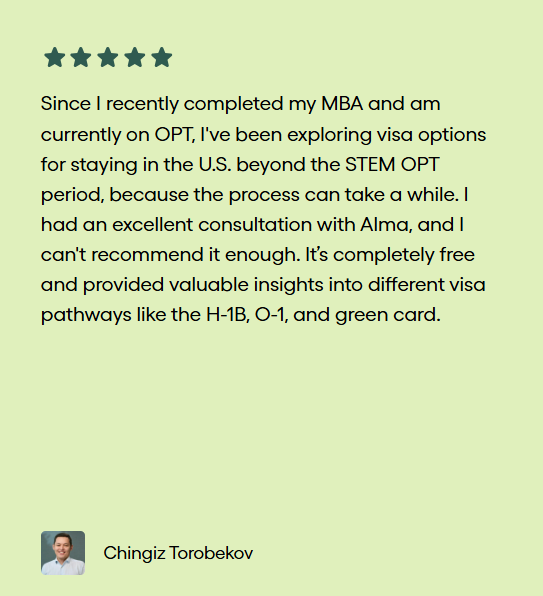
Frequently Asked Questions
Yes, the O-1A can serve as a stepping stone for startup founders to later pursue an employment-based Green Card, like the EB-1A (Extraordinary Ability) or the EB-2 NIW. The EB-1A is considered a natural extension of the O-1A as it shares the same core criteria, plus two more.
Making the transition means filing an immigrant petition (usually Form I-140) in the appropriate category and then, when their priority date is current, completing either an adjustment of status in the U.S. or consular processing abroad. That said, timing and travel plans can matter, especially once a Green Card petition is pending, so it’s important to plan. Alma’s immigration lawyers help clients navigate these steps so the path to permanent residency stays aligned with both legal requirements and business goals.
Yes, someone in the U.S. on an H-1B visa can switch to O-1 status without leaving the country, if they meet the eligibility requirements. The process involves filing a change of status petition (I-129) with USCIS.
There are a few factors to consider, though, including the fact that while on the H-1B, you can’t do any work (paid or unpaid) for your own U.S. company or side project unless that entity files a valid (and concurrent) H-1B petition for you. Such matters are important to discuss with your immigration attorney.
Yes, an O-1 visa holder can bring their immediate family to the United States.
Spouses and unmarried children under 21 years old are eligible to accompany the primary O-1 visa holder by applying for O-3 dependent visas. These O-3 dependents may live and study in the U.S. for as long as the O-1 visa remains valid, but they’re not permitted to work during their stay.
%20(2).png)
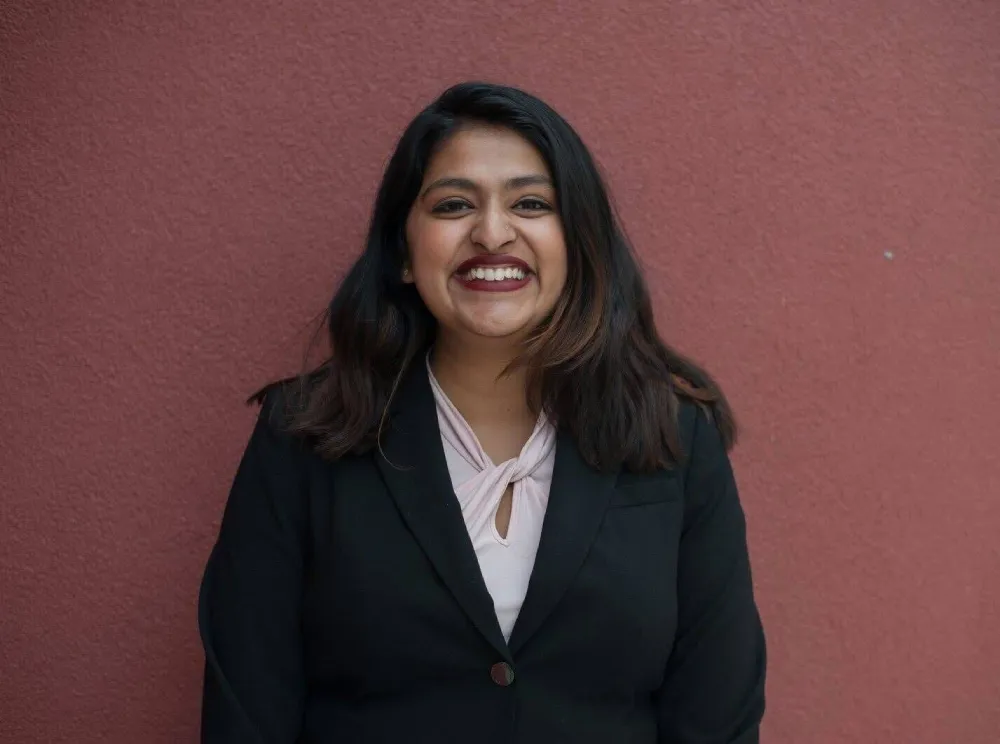


.png)
